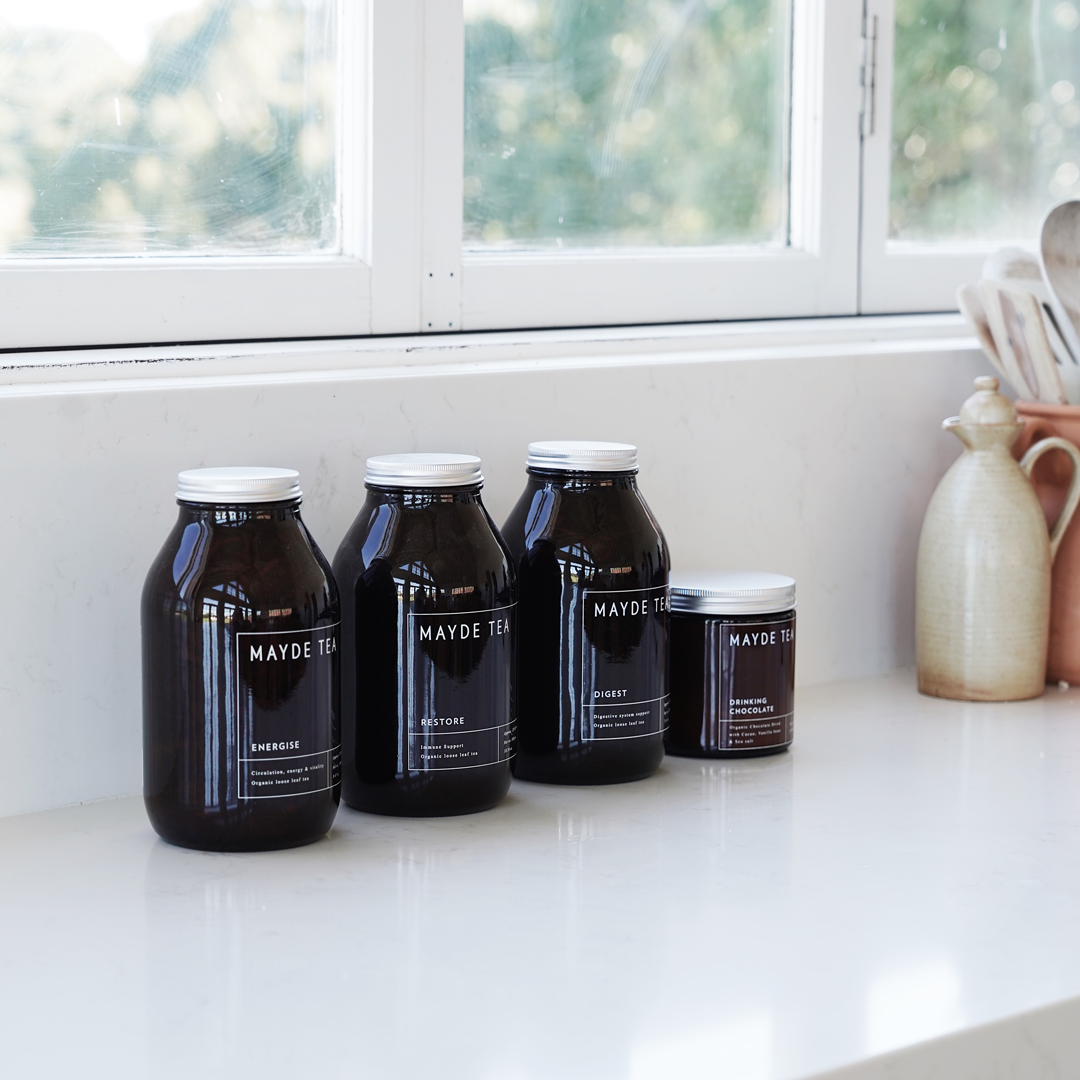A Cuppa with Naturopath Lucy Fitzgibbons

Hi Lucy, can you please tell us a little bit about yourself and your background in naturopathy?
I’ve been a naturopath for nearly six years and run my own online clinic specialising in women's reproductive health. At our clinic, we support women at every stage of their reproductive journey, addressing concerns ranging from hormonal imbalances to fertility, pregnancy, and beyond. Recently, I've also embraced the joys of motherhood with the arrival of my first baby, and I'm deeply in love with this new chapter of my life.
How did your personal experience of recently having a baby influence your approach and understanding of postpartum and breastfeeding support?
I am 4 months postpartum after having my baby girl, Violet. My postpartum experience has been positive thanks to the amount of support I have around me. The physical and emotional changes that you experience after having a baby are monumental. My own experience reiterated that fact that you are so vulnerable in those early days and there is such a huge need to take it slow. Food & herbal medicine played a massive role in helping me recover from a long labour & intense birth.
How do you approach postpartum care from a naturopathic perspective, and what specific support do you provide for new mothers during this crucial stage?
In the immediate postpartum I place a big emphasis on 4 key areas - food, hydration, rest & herbs/supplements.
Food should be abundant to help with milk production - lots of calories are needed! Proteins and fats are essential to support the body with its energy requirements to create breastmilk & heal from birth. Include key foods such as slow-cooked meats, buttery scrambled eggs, oily fish, avocados, leafy greens, herby bone broth and fermented foods. In those early weeks, I made sure to start the day with either a bone broth or a matcha with a big scoop of collagen powder in it.
Hydration is important for breastfeeding mamas. Add a pinch of sea salt or Himalayan salt to your water bottle to ensure proper cellular hydration.
Rest - True healing comes from absolute rest. No matter how you birth, your reproductive organs have gone through so much and to help your uterus & pelvic floor recover it is beneficial to spend the majority of your day lying down. This can also help to minimise bleeding by reducing pressure on the pelvic area.
Herbs & supplements should be specific to each mother however as a general recommendation I advise most women to take a good quality prenatal, fish oil, probiotics & magnesium. On top of this there can be extras I add in based on concerns that arise.

What are some common challenges that new mothers may face during the postpartum period, and how do you address them using naturopathy?
Two common challenges I see new mothers face are mastitis and fatigue.
Mastitis can be quite common in the first few months of breastfeeding. I educate new mothers on the signs to look out for and I prescribe probiotics that help to reduce the occurrence of mild mastitis. I also provide most of my clients with a ‘just in case’ herbal tonic that they can use to support their immune system if they do start developing symptoms of mastitis. Mastitis can come on very quickly so it is great to have something on hand and ready to go. I find echinacea & poke root work wonders but it is best to talk to a naturopath to check if those herbs are right for you.
Fatigue in mothers can arise from various factors such as sleep deprivation and nutrient depletion. I love prescribing herbal adaptogens to help mothers cope with the demands of motherhood. Adaptogens are a category of herbal medicine known for their ability to assist the body in adapting to physical and mental stressors. Some beneficial adaptogenic herbs for mothers include withania, rhodiola, and shatavari. These herbs can help support energy levels, promote resilience to stress, and enhance overall well-being during the demanding phases of motherhood.
Can you discuss the importance of supporting the physical and emotional well-being of postpartum women, and what is a specific strategy you can recommend?
One strategy that I find helps a lot of my clients is to plan your postpartum. What this means is taking some time while you are pregnant to map out how you are going to be supported in your transition to motherhood. It can be as simple as a note in your phone that outlines your plans & preferences for the following key areas:
- Food: Are you planning to batch cook & fill your freezer before the baby comes? Who will do the shopping and cooking? Do you want a meal-train? Compile some recipes to send to friends & family so they know what to cook for you. The book ‘Village for Mama’ is a great resource.
- Emotional: Who are your go-to support people? Can you have conversations with them prior to birth about how they can best support you with the emotional challenges? Mothers groups?
- Breastfeeding: Have the contact information of a lactation consultant so you know who to contact if challenges arise. Can you do a breastfeeding course while you are pregnant?
- Household: How can you delegate tasks & responsibilities? (friends, family, hired help)
- Healthcare: Who is in your healthcare team? Do you need to pre-book any postpartum appointments?
- Relationships: Discuss communication strategies, expectations and ways you can support each other as you navigate parenthood.
The questions above will hopefully spark some discussions that are beneficial to have before birth. By having a rough plan you and your support network can better prepare yourselves for your postpartum journey.

Postpartum can be a beautiful but overwhelming time, what advice do you have for new mothers who want to support their own healing while also caring for their baby?
It's a common experience to find ourselves deeply engrossed in the demands of caring for a newborn, often at the expense of our own well-being. During those initial weeks, I often recited a simple mantra to myself: “Healthy mum, healthy baby. Calm mum, calm baby”.
Recognising that my own state directly impacted the energy and environment that my baby was surrounded by. I made a deliberate effort to prioritise self-care. I understood that by attending to my own needs, I could better fulfil my role as a mother.
For me, self-care didn’t involve luxurious treatments like facials and massages. Instead, it meant focusing on fundamental aspects such as adequate sleep, nutritious food, staying home, and being selective about activities that contributed positively to our well-being.
How do you support mothers who may have concerns about the quality or quantity of their breast milk?
A galactagogue is a substance that promotes or enhances the production of breast milk. Galactagogues may work by affecting hormone levels, increasing milk duct stimulation, or improving overall lactation physiology.
Foods that are beneficial for milk production are oats, flaxseeds, and almonds.
Key galactagogue herbs are fennel, fenugreek, goat's rue and blessed thistle. These herbs can be found in teas, tinctures and capsules. One study found that mothers who consumed a herbal tea containing fenugreek, fennel & anise had significantly higher milk volumes compared to the control group.
It is key to note that some other factors that contribute to milk supply are adequate hydration, plenty of calories, skin-to-skin with your baby, and a low-stress environment. Lactation consultants are absolute angels when it comes to any issues with breastfeeding and I highly encourage you to seek support if you are having challenges.

Can you explain the potential benefits of herbal teas or supplements for breastfeeding women, and are there any precautions or considerations to be aware of?
There are 5 key benefits of herbal teas for breastfeeding:
- Increase Milk Supply: Certain herbal teas such as fenugreek, blessed thistle, and fennel seed have galactagogue properties, which can increase milk production in breastfeeding women.
- Relaxation and Stress Reduction: Some herbal teas like chamomile and lemon balm may have calming effects, helping breastfeeding mothers to relax and reduce stress, which can indirectly support milk production.
- Alleviation of Digestive Issues: Herbal teas such as ginger, chamomile and fennel can help alleviate digestive discomforts like bloating, gas, and indigestion, which can be common during the postpartum period. I also believe that these digestive benefits can be passed onto baby through breastfeeding.
- Nutrient Boost: Certain herbal teas like nettle leaf and raspberry leaf are rich in nutrients like iron and calcium, which can support postpartum recovery.
- Hydration: Drinking herbal teas can contribute to overall hydration, which is crucial for breastfeeding mothers to maintain milk supply and support their own health.
There are 2 herbal teas that I would recommend steering clear of when breastfeeding.
1- Peppermint tea consumed in large amounts may diminish milk supply by reducing prolactin, a hormone responsible for milk production.
2- Sage tea is often prescribed as a natural remedy to reduce milk supply for mothers who are weaning or experiencing over-supply issues.
What Mayde Tea product have you been loving lately?
I have 3 products that I keep coming back to:
Hibiscus Lemon Myrtle Iced Tea - my favourite drink during summer.
Chai Latte Powder - I had this lots when I was pregnant and avoiding coffee.
Nursing tea - my new go-to for supporting my breastfeeding journey.
What are you currently...
Listening to: Birth podcasts
Reading: The Throne of Glass series by Sarah J Maas
Watching: Nothing. I am in a committed relationship with my kindle.
Eating: Eggs! Often scrambled in grass-fed butter. They are so high in wonderful nutrients for breastfeeding.



Leave a comment
This site is protected by hCaptcha and the hCaptcha Privacy Policy and Terms of Service apply.